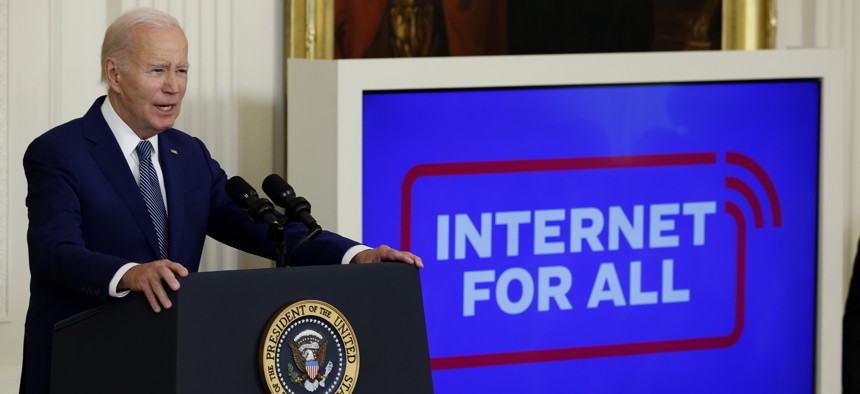Policy
Florida to get over $1 billion to boost high-speed internet access
The Biden administration released the funding under the bipartisan infrastructure law to expand 'broadband' access in America’s under- and unserved communities.

President Joe Biden announces a $42 billion investment in high-speed internet infrastructure during an event in the East Room of the White House. Chip Somodevilla via Getty Images
Florida will receive over $1.1 billion as part of the nation’s nearly $42.5 billion investment in broadband under the bipartisan infrastructure act.
Eighteen other states will receive at least $1 billion, according to figures announced by the National Telecommunications and Information Administration (NTIA). Topping the list is Texas, which will receive $3.3 billion to expand broadband in the state.
“What this announcement means for people across the country is that if you don’t have access to quality, affordable high-speed internet service now — you will, thanks to President (Joe) Biden and his commitment to investing in America,” U.S. Commerce Secretary Gina Raimondo said in a statement.
“Today’s announcement is an important step in the deployment of accessible, reliable high-speed internet for our residents, businesses and other essential community facilities,” National Association of Counties Executive Director Matthew Chase said.
The announcement comes after some last-minute drama over the formula NTIA used to decide how much each state should get. To make sure the billions go to where they're needed most, places with either no or poor internet access were prioritized in a revised map from the Federal Communications Commission.
Under the revisions, Michigan lost about $400 million, according to one estimate. However, the state’s broadband office recently “took quick and aggressive action” to challenge the new numbers, Eric Frederick, chief connectivity officer for the Michigan High-Speed Internet Office, said in a statement to Route Fifty. He said that under the office's own estimates, the state ended up getting about $140 million more than they anticipated.
The state’s share of the funding, Frederick said, will be a “vital part in expanding high-speed internet access and digital equity to over 200,000 Michiganders in unserved and underserved areas across the state."
Among the other states that will receive at least $1 billion is Missouri, which will get more than $1.7 billion. North Carolina and Virginia will each receive about $1.5 billion. Alabama will get $1.4 billion, and Louisiana and Georgia will each get more than $1.3 billion.
Although the numbers were announced on Monday, they will not become formal until Friday. What comes next is that states will have 180 days from Friday to submit a plan to NTIA on how it will use the funding.
Among the questions each plan will need to address are how states will make broadband being built affordable for lower-income people. Congress in the Infrastructure Investment and Jobs Act required states to create a “low-cost option,” but left it up to states to decide what that means.
A version of this story was first published on Route Fifty.
NEXT STORY: As Florida-based Moms for Liberty comes to Philly, tensions are running high
